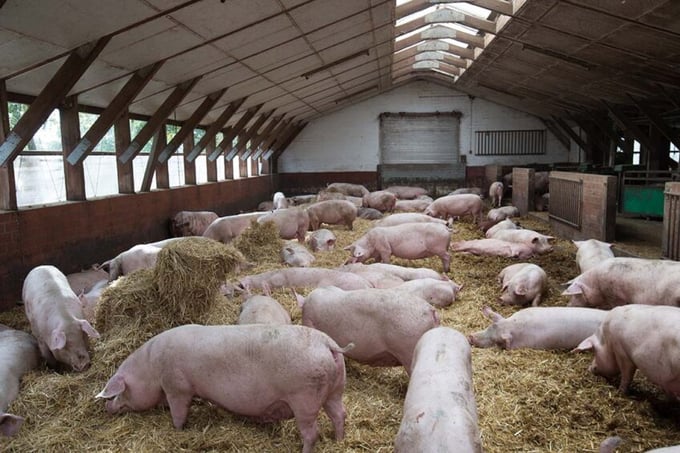November 28, 2025 | 06:43 GMT +7
November 28, 2025 | 06:43 GMT +7
Hotline: 0913.378.918
November 28, 2025 | 06:43 GMT +7
Hotline: 0913.378.918

Photo: Michel Velderman.
An assessment based on scientific indicators measured directly at the animal level should be the foundation. Such a system should not only take account of the living conditions of the food-producing animals themselves, but of those of their parents as well.
According to Anses, consumers are increasingly concerned about the living conditions of the animals used to produce foodstuffs. Anses therefore is publishing guidelines for labelling products of animal origin specifically with respect to farm animal welfare. Implementing this proposal would harmonise current and future labelling systems, the agency says.
Labelling systems designed to inform consumers about the welfare of food-producing animals are on the rise in Europe. However, the criteria used vary widely from one labelling system to another, causing a high degree of confusion for consumers. The European Union is planning to harmonize labelling. Anses has thus carried out an expert appraisal to establish a scientific basis for animal welfare labelling that can be put forward to livestock sector players.
Anses recommends adopting a system of 5 welfare levels, from the highest (A) to the lowest (E). Level E corresponds solely to compliance with the requirements imposed by European legislation on animal welfare, whether during rearing, transport or slaughter. This classification, which is easy for consumers to understand, should also help producers to gradually take better account of animal welfare.
Most current animal welfare labels only consider the rearing methods used and the means employed to improve them, Anses says. “That’s not enough”, explains Julie Chiron, Expert Appraisal Coordinator: “A laying hen farm may have perches, but if the hens do not use them because they are not easily accessible, for example, this feature will not contribute to their welfare.”
The scientists in the Anses working group therefore recommend that the indicators should focus primarily on the animal’s welfare status, i.e. be based on measurements taken on the animal level. This system is based on the definition of animal welfare proposed by Anses in 2018: “The welfare of an animal is its positive mental and physical state related to the fulfilment of its physiological and behavioural needs and its expectations. This state varies according to the animal’s perception of the situation.”
Furthermore, the assessment of animal welfare should also include the selective breeding and reproduction farms that are designed to improve genetic characteristics and supply food-producing animals. “In some sectors, breeding animals are reared abroad and little is known about their living conditions”, explains Julie Chiron. “This criterion will require the sectors to ensure that they have this information. We cannot claim that a production process respects animal welfare if we know nothing about the living conditions of the previous generation, whose rearing is subject to specific constraints, particularly health constraints.” When no information on parents is available, the experts consider that products should not be given a classification higher than level C.
“The work that has been carried out is aimed primarily at French and European scientists and stakeholders who are planning to develop a reference framework for animal welfare labelling”, specifies Florence Étoré, who heads the unit in charge of assessing risks associated with animal health and welfare. “This framework will need to be tailored to each sector or category of animal concerned, and jointly developed with the various players in this sector: livestock professionals, animal protection associations and scientists.”
The framework must also be accessible and transparent, so that consumers can be informed about the indicators used to assess animal welfare and obtain an overall score. Finally, the experts emphasise that the cost of improving animal welfare and its assessment should be borne by all stakeholders, given the ethical issues involved and society’s growing calls for greater consideration to be given to animal welfare.
(PP)

(VAN) A new study reveals how the simultaneous effects of ocean acidification, salinity and loss of oxygen are making the world more fragile.

(VAN) Hopes are growing that the creation of the first 3D turkey gut model could be a turning point in the battle against the virulent blackhead disease.

(VAN) Tyson, America’s biggest meat supplier, plans to shutter one of its largest beef processing plants as the industry continues to struggle with low cattle supplies and political pressure from Washington.

(VAN) New FAO study shows how digital solutions are empowering farmers and fishers to prevent losses and build resilient agrifood systems.

(VAN) Brazil's COP30 presidency pushed through a compromise climate deal on Saturday that would boost finance for poor nations coping with global warming but that omitted any mention of the fossil fuels driving it.

(VAN) Poultry farmers in the UK have been warned that they could face one of the worst winters yet for bird flu.

(VAN) Prices of main-crop paddy have risen sharply, with jasmine rice hitting 16,100 baht per tonne — the highest level in years.